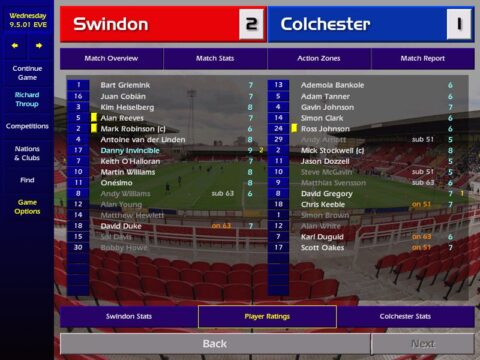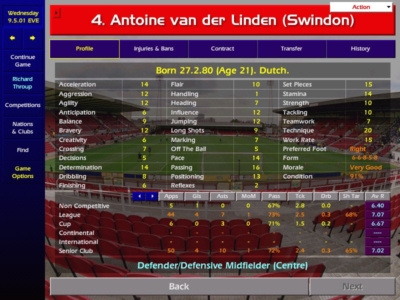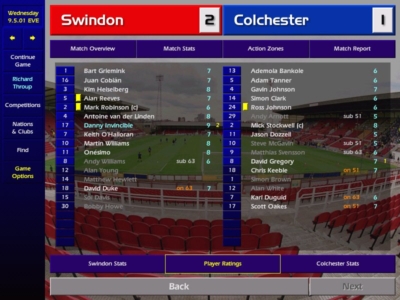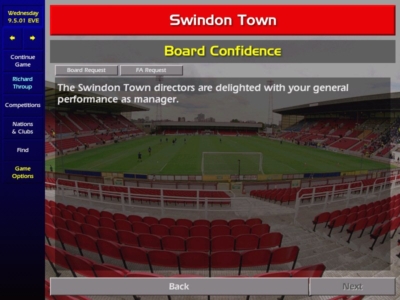
Championship Manager 00-01
Written by: Rik
Date posted: September 13, 2005
- Genre: Sport
- Developed by: Sports Interactive
- Published by: Eidos
- Year released: 2000
- Our score: 9
Such has been the success of the Championship Manager games here in Britain, many of its devotees, myself included, naturally assumed that the phenomenon had spread worldwide (well, throughout Europe at least) and that the game’s developers lived in big castles counting their well-deserved millions while their slaves cranked out the latest seasonal update. However, in an interview published around about the same time as this version, it was revealed that the only other place where CM shifts a significant number of copies is Scandinavia. So, for those of you who don’t live in dark, cold countries, and who may not be immediately familiar with the series, here’s the breakdown: it’s a football management game, it looks like a spreadsheet and it has the power to take over your life.
Unsurprisingly, not everyone is convinced. For one thing, football and gaming have an uneasy relationship, and though the lad/nerd culture clash is slowly receding, there remains a significant gap between those who partake in occasional multiplayer Pro Evolution Soccer and those who spend their weekends in a fantasy world hitting imaginary monsters with an axe (or whatever, I’ve never really played an RPG, okay?). And while CM fans may revel in its all-consuming nature, and even admit to missing the occasional night down the pub to play a season, the fact that it may be the only game in their collection counts against them in the eyes of any non-footballing hardcore gamer. And, as we’ve already mentioned, it looks like a spreadsheet. For these doubters, the temptation seems to be to dismiss Championship Manager as either an insultingly basic non-game for simple-minded, football-loving chimps, or as a mystifyingly complicated array of numbers and statistics, with which it seems difficult to reconcile the essentially basic concept of 22 men lumping a ball around an area of muddy turf for an hour and a half.
Frankly, though, they’re wrong. The main reason for CM’s success is that it contains exactly the right amount of detail, or to be more precise, detail in the areas that matter most – namely the matches, the transfer market, and your relationships with the media, players, fans and the board. There have been countless other games which have offered players the opportunity to fiddle around with the stadium, manage the club shop and generally get involved in the commercial side of football – which is all very nice if any of that stuff was even mildly interesting to the average football fan, but it isn’t, and neither is it the kind of thing José Mourinho or Arsene Wenger spend any time worrying about. Worse still, the ability to set the meat content of your club’s pies almost always comes at the expense of accuracy of the basic data – which is one of the most important aspects of any football management game. Football fans aren’t bothered about increasing revenue through advertising and replica shirt sales, but if they load the game up and find that their favourite players playing for the wrong team, or in the wrong positions, or if they just aren’t there at all, then there’s a fair chance they aren’t going to like it.
In Championship Manager, you can’t build a burger bar outside the stadium, nor can you apply for planning permission for a new car park, but by and large the players are all in the right place. Football fans buy a management game because they want to take control of a club (more often than not, the team they support in real life), pick the team, get involved in the transfer market and make it successful. One of the reasons CM succeeds is because it recognises this, indulging a relatively simple fantasy without too many unnecessary distractions. At the same time, the level of detail contained within the core game is staggering, and even with the focus purely on footballing matters, there’s an almost overwhelming amount of stuff to do. Put simply, it might not look much, but it’s got it where it counts.
Thus far I’ve been talking about CM generically, rather than the version up for review here. As with all sports games, it’s a bit of a tricky one, but Season 00-01 is the one I’ve spent the most time playing, and certainly the last version I became seriously addicted to. CM4 was a little disappointing, but by all accounts more recent updates (including the latest, Football Manager 2005) have been up to the mark. However, they’re too new and too processor-hungry to warrant consideration for FFG: suffice to say that if this sort of thing is your cup of tea and you’ve got the hardware, then the newer versions might be a good bet, but on the other hand, having spent some considerable time re-visiting this one for this review myself, the older versions still have plenty to offer. CM 00-01 is the third incarnation of Championship Manager 3: the rather buggy prototype attracted a fair amount of criticism, but each seasonal update brought fewer bugs, more stability and new features. Obviously 01-02 is the most complete version of CM3, but 00-01 boasts most of this chapter’s hallmark features, in particular the involvement of the media.
How you approach CM 00-01 is up to you. There are those who believe that variety is the key to prolonged enjoyment, happily starting new games with different teams, abandoning unsuccessful ones, setting themselves short-term challenges within a specified time frame and so on. Even the game’s manual urges you to try playing the game at different levels, facilitating a fuller understanding of how CM works, and generally making you a better manager. For others, only one team will ever do, be it the side they follow religiously in real life, or (as in my case) the one they just happened to pick during their first CM experience and either through genuine affinity or just plain superstition refuse to choose anyone else. As long as I play Championship Manager, I will always be Swindon Town: don’t ask me to explain it, I’ve never even been to Swindon (although apparently it’s not that nice).
The team you pick also determines what kind of challenges you are to immediately face: choose a smaller club and you may not have a great deal of money at your disposal, but chances are the board will be more patient with you than at a big club, where you may be able to stamp your authority on the squad more quickly with big-money signings, but the chairman and fans expect the success they feel their team deserves. Personally, I like the idea of taking a small-town team into the Premiership, but for others only the Champions League will do. Both present different kinds of problems and challenges, but are each rewarding in their own way.
Once you’ve sorted your team out, it’s time to get on with the game. Essentially, CM 00-01 is a turn-based strategy game: time stops on a particular day, you take as much time as you need to perform a few actions before hitting a button to move time in the game world forward a couple of days or so. One of the first points to note is just how well designed the interface is. It’s a system that’s been refined and honed throughout the series’ development, and generally works on the principle that if you need to know about something, all you have to do is click on it. There are no confusing symbols, very few drop-down menus, and nothing is more than a couple of mouse-clicks away. With so much information on offer in the game, the last thing a new player needs is to become bogged down in the menu system – luckily, CM’s is fluid and intuitive.
As with other turn-based strategy games, the best approach is a cautious one, at least initially, and it’s worth taking your time doing everything you need to before you click that “continue game” button. Things like transfer deals and sorting out your coaching staff can take a while; like in real life, such things aren’t instantaneous. For example, buying a player can take a number of days while you first negotiate with his club over the transfer fee and then make an offer to the player in terms of his contract and the role you have in mind for him at the club. During the quiet pre-season period, such things don’t seem to matter that much, but once you find yourself in the middle of a packed fixture list with an injury-ridden squad, bringing in the right players quickly is a tricky task. Once you start to get involved in the game, time tends to move forward a little more quickly, although it is possible to suffer from “CM-madness” during a bad run of results, ignoring important details in favour of getting to the next match as quickly as possible: such an approach rarely, if ever, pays off, and a decent situation can quickly slide towards getting the sack in the early hours of the morning.
Regardless of how talented your initial squad is, chances are you’re going to be spending a lot of your time dabbling in the transfer market. Particularly when working with lower-division also-rans, more often than not you’re going to have to rebuild your squad to achieve success. In previous incarnations of CM, this was pretty easy to achieve – you could pay off your shit players and give them free transfers, while attracting new signings was not really a big problem. CM3 tightened this up somewhat, and a similar approach in 00-01 is likely to incur the wrath of the board and eat into your transfer budget. If you’ve got bad players on big contracts, you have to move them on in a more conventional manner – putting them on the transfer list and leaving them to rot in the reserves, for example. Similarly, finding good players to improve your team is no easy task. Decent players who are happy at their current club often demand a huge wage packet as compensation for moving, and even offering them significantly more money than they’re currently on may fail to entice them away. The board also place restrictions on the kind of money you can offer new signings, and if you’re not a particularly big club then it’s frequently not enough to attract quality players. Thankfully, while the British market might be a little tricky to exploit, there’s plenty of talent to be found elsewhere in Europe. If you have a group of reasonably competent scouts at your disposal, packing them off to Belgium, Spain and Sweden can uncover a few gems, and personally speaking, my best years at Swindon were mainly down to the performances of talented young Scandinavians brought in on the cheap.
Speaking of scouts, your backroom and support staff are more important than ever in 00-01. They now have attributes, reflecting things like their coaching skill and ability to judge a player. You can consult your assistant manager and coaches for their opinions on players in your squad and potential transfer targets. They aren’t the most detailed or descriptive reports in the world, but for fringe players or those who are the subject of a transfer bid, a strong reaction for or against can help to decide whether they have a future at the club or not. A nice touch is that staff also have career ambitions of their own, and they won’t stick around earning £200 a week as Swindon coach if they get the opportunity to manage a club themselves or become the assistant to a Premiership boss.
On the pitch, the game engine itself has undergone quite a radical overhaul. God only knows what kind of number crunching goes on behind the scenes in CM, but the developers have admitted that for all their excitement, matches in early versions of the game relied on random elements: while the text might have been describing a move in great detail, it didn’t necessarily reflect anything happening behind the scenes. The match may have told you it was a twenty-yard screamer, but as far as the engine was concerned, it was just another goal. Superficially, nothing has changed: the matchday screen is still extremely low-tech and incidents are described in coloured text-boxes, but this time around there’s a real sense that the matches are actually being played out. Championship Manager 4 may have been the game to break with tradition by allowing you to watch a visual representation of the matches (albeit with tiny dots) but the foundations were laid with CM3. Sustained periods of pressure and chances are now relayed with more accuracy, which in turn allows for more informed decision-making during the match.
In terms of tactics, there’s much more to preparing the team than just setting the formation. The outlook of the team, how hard they go into the tackle, as well as the general passing “style” (familiar to fans of the series) can all be selected, and now individual players can be given specific instructions, too. It gives you plenty to tinker with if things aren’t going to plan without changing your system completely, and it’s particularly useful if you’re trying to get more out of a talented player who might be underperforming.
For long-time CM-fans, these features are just part of the constant evolution of the series – better, faster, stronger. This is not to say that the changes are superficial, more that they’re in areas in which CM has traditionally been strong – in the transfer market, and on the pitch. However, interaction with the media has been a relatively recent development, and in 00-01 it’s a fully-fledged part of the game. Of course, pretend managers all over the country have been imagining how they’d handle press conferences and post-match interviews for years: the media circus that surrounds football is in many ways part of the sport’s appeal. Ferguson/Wenger-style “mind games” may not be an option (although it has been implemented in later versions), but the local media ask you about player performances and new signings, and when agents stir up transfer talk in the papers, or players make controversial comments in an interview you’re asked to give a response. The choice of available responses isn’t vast, essentially amounting to taking either a confrontational or passive stance, but it does make a difference, not just to the player in question but to the squad as a whole. After some time as an armchair manager you develop a strong sense of the type of manager you want to be, and responses to press speculation are soon instinctive decisions based on this self-image. It’s a welcome addition, fitting in nicely with the rest of the CM experience without ever seeming gimmicky or detracting from the other elements of the game.
Despite rambling on for quite a while I still haven’t really scratched the surface of what Championship Manager has to offer. The proof of the pudding is in the, er, playing, really, and no amount of praise can really get across what an immersive and involving experience CM can be (for alternative attempts to get this across, see my Diary of a CM-adman). In any case, I find it difficult to believe there are too many British gamers who haven’t at least heard of it, and frankly, those with even a passing interest in football are likely to have given it a go and made up their own minds some time ago. If for some reason, you’ve never heard of CM, and it sounds like it might be your cup of tea, then all I can say is that I heartily recommend it. Something resembling an interest in real-life football can only help; I have heard tales of people playing CM with no interest in the sport and enjoying it (and in some cases developing an interest in the real thing) but I’m not sure I believe them. Still, with plenty of cheap, old versions of the game available (00-01 can be picked up for a couple of quid on eBay) and all the potential fun you can have, it seems like a risk worth taking.
In terms of faults, I can’t think of anything too substantial. The training aspect of the game is something that isn’t too well implemented: I certainly never worked out how to use it properly. To be honest, though, the training ground isn’t the most interesting part of being a manager, and if you ignore this aspect of the game altogether then it doesn’t seem to affect anything too much. And, while I’d love to be able to give CM 00-01 full marks, the fact remains that it represents a mid-point in the evolution of a successful series which has since continued to get better and better. For hardcore football fans, the latest stats and data are extremely important, and anyone with the money and hardware at their disposal looking for the best football management game around would be better served the latest version. That’s not to deny the entertainment value of CM 00-01 though, which not only deserves recognition as a chapter in an extremely successful series, but as a great game in it’s own right.






 Posts
Posts